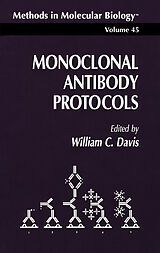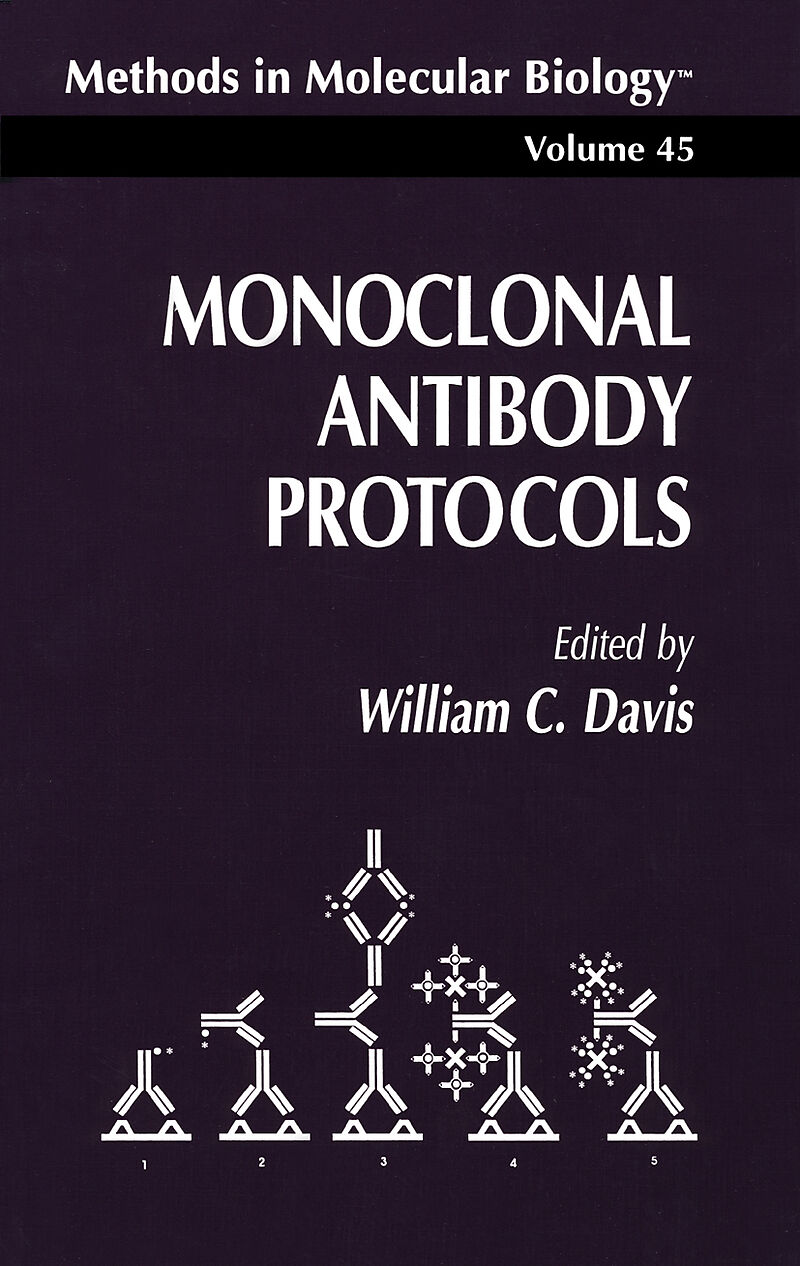Monoclonal Antibody Protocols
Einband:
Kartonierter Einband
EAN:
9780896033085
Untertitel:
Englisch
Genre:
Medizin
Autor:
William C. Davis
Herausgeber:
Humana Press
Auflage:
1995
Anzahl Seiten:
276
Erscheinungsdatum:
23.05.1995
ISBN:
0896033082
Since the initial description of techniques to immortalize anti body-producing B-lymphocytes by fusion with tissue culture-adapted myeloma cells, methods have been developed to produce monoclonal antibodies of defined specificity in multiple animal species. Stable hybrids can be readily produced in mice using a number of myeloma and hybridoma cell lines. To obviate the problem of identifying fusion partners in other animal species, xenohybrids have been produced using B-lymphocytes from the relevant species and mouse myeloma cells. The use of xenohybrids has minimized the problem of obtain ing stable antibody-producing hybrids in all species examined thus far. Although alternative techniques are being developed to produce monoclonal antibodies by molecular methods, hybridoma technol ogy will remain the technology of choice for producing monoclonal antibodies for a variety of applications in research and industry. The objective of Monoclonal Antibody Protocols is to provide investigators with a set of methods for producing and using mono clonal antibodies in biomedical, agricultural, and biological sciences. The book is not intended to provide methodology for all possible applications, but rather a series of methods presented in an easy-- follow format that can be used by new and established investiga tors, graduate and postgraduate fellows, and technical staff.
Klappentext
Monoclonal Antibody Protocols provides researchers in biomedical, agricultural, and biological science with a set of detailed, easy-to-follow methods for developing and using monoclonal antibodies. The protocols emphasize techniques that optimize the outgrowth of hybridomas from primary cultures of fused cells and the use of an alternative, electric-field-mediated cell fusion technique to increase the yield of hybridomas. The book stresses antibodies produced in mice, but includes methods of producing xenogeneic hybrids that yield human, bovine, equine, and porcine monoclonal antibodies.With its detailed instructions, its comments on how to alter the various steps of a protocol in order to accommodate different materials, and its hints and tips that often make the difference between success and failure, Monoclonal Antibody Protocols provides you with a ready and indispensable source of information for preparing and using monoclonal antibodies successfully in your laboratory.
Inhalt
Methods of Immunization to Enhance the Immune Response to Specific Antigens In Vivo in Preparation for Fusions Yielding Monoclonal Antibodies.- Methods of Immunization to Enhance the Immune Response to Specific Antigens In Vitro.- Culture Conditions that Optimize Outgrowth of Hybridomas.- Production of Stable Heterohybridomas Producing Human Monoclonal Antibodies.- Production of Stable Bovine-Murine Interspecies Hybrids.- Production of Monoclonal Antibodies in Swine.- Production of Monoclonal Antibodies in Horses.- Use of Electric-Field-Mediated Cell Fusion to Produce Hybridomas Secreting Monoclonal Antibodies.- Rapid Isotyping of Mouse Monoclonal Antibodies.- Methods of Measuring Antibodies in Sera/Plasma, Ascites, and Tissue-Culture Media.- Measurement of Immunoglobulin Synthesis Using the ELISPOT Assay.- Use of Monoclonal Antibodies in Immunohistochemistry.- Use of Monoclonal Antibodies in Immunoelectron Microscopy.- Use of Monoclonal Antibodies for Western Blotting with Enhanced Chemiluminescent Detection.- The Use of Directly and Indirectly Labeled Monoclonal Antibodies in Flow Cytometry.- Use of Monoclonal Antibodies and Flow Cytometry to Cluster and Analyze Leukocyte Differentiation Molecules.- In Vivo and In Vitro Production of Monoclonal Antibodies.- Separation of Monoclonal Antibodies from Cell-Culture Supernatants and Ascites Fluid Using Thiophilic Agarose.- Detection, Purification, and Utilization of Murine Monoclonal IgM Antibodies.- Preparation and Use of Immunoaffinity Columns with Monoclonal Antibodies Without Purification from Ascites and Tissue-Culture Medium.- Antigen Purification by Monoclonal Antibody Immunoaffinity Chromatography.- Coupling of Monoclonal Antibodies with Fluorophores.- Coupling of Monoclonal Antibodies with Biotin.- Coupling of Monoclonal Antibodies with Enzymes.- Use of Monoclonal Antibodies with Magnetic Particles to Separate Cell Subpopulations by Negative Selection.- Use of Monoclonal Antibodies with Magnetic Particles to Separate Cell Subpopulations by Positive Selection.

Leider konnten wir für diesen Artikel keine Preise ermitteln ...
billigbuch.ch sucht jetzt für Sie die besten Angebote ...
Die aktuellen Verkaufspreise von 5 Onlineshops werden in Realtime abgefragt.
Sie können das gewünschte Produkt anschliessend direkt beim Anbieter Ihrer Wahl bestellen.
Loading...
Die aktuellen Verkaufspreise von 5 Onlineshops werden in Realtime abgefragt.
Sie können das gewünschte Produkt anschliessend direkt beim Anbieter Ihrer Wahl bestellen.
| # | Onlineshop | Preis CHF | Versand CHF | Total CHF | ||
|---|---|---|---|---|---|---|
| 1 | Seller | 0.00 | 0.00 | 0.00 |
